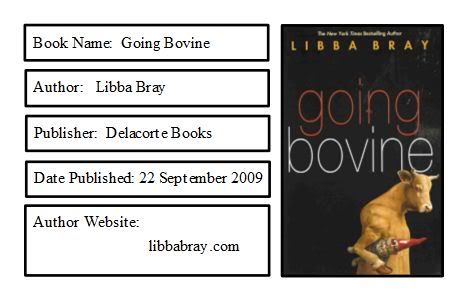
Can Cameron find what he’s looking for?
All 16-year-old Cameron wants is to get through high school—and life in general—with a minimum of effort. It’s not a lot to ask. But that’s before he’s given some bad news: he’s sick and he’s going to die. Which totally sucks. Hope arrives in the winged form of Dulcie, a loopy punk angel/possible hallucination with a bad sugar habit. She tells Cam there is a cure—if he’s willing to go in search of it. With the help of a death-obsessed, video-gaming dwarf and a yard gnome, Cam sets off on the mother of all road trips through a twisted America into the heart of what matters most.
In a book less dark than her X series, Libba Bray creates a psychologically deep book that is also a very entertaining read. Going Bovine is full of the fantastic: a fairy/angel character as well as a talking yard gnome, and yet it could also be read as an entirely realistic contemporary fiction book. All these doubts in what is going on center around the narrator, Cameron. Cameron is a normal boy when he starts getting hallucinations. He finds out he has a rare form of Mad Cow disease and sets off to find someone who can cure him before he dies. Cameron is an (understandably) driven character in the book, a kid who still has some sarcasm left in him but is also overcome at many times with fear and longing for a normal life. His “imaginary” friends Dulcie and Balder, are well developed as well and you feel they are along for the ride for a purpose and have good reason to help Cameron. The plot moves well, with a few slow spots for exposition but mostly moving along nicely thanks to Cameron’s drive and softened by his sense of humor. The ending, though, is amazing. It feels like you have been watching a semi truck come towards you for what seems like ages only to be hit from the side by a bus right as you’re bracing for the semi’s impact. And it is a hell of a bus, too. Bray has us questioning what of Cameron’s quest was real and what was fake, and does it really matter what the difference is in the end? This is a great stand-alone book that deserves a thorough reading.


No comments:
Post a Comment